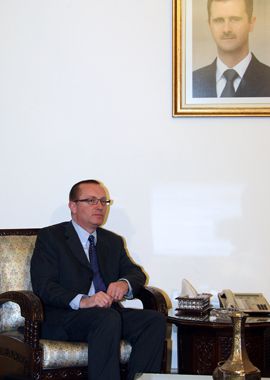US talks in Syria ‘constructive’
Senior US diplomat says talks with Syrian officials in Damascus was “comprehensive”.

Feltman and Shapiro are the first high-level US officials to visit Syria since January 2005, and the trip is in line with the policy of Barack Obama, the US president, of reaching out to all nations in the region.
“The president has said he wants to sustain … principle engagement with all states in the region and that includes Syria,” Feltman said in Beirut before the trip.
Significant visit
Speaking after the talks, Feltman told Al Jazeera that the talks with Syrian officials were an attempt to “achieve results through engagement.”
“The president [Obama] believes that talking should not be considered a reward – talking should be the means to achieve objectives,” he said.
“I think there are a lot of areas where the US and Syria have overlapping interests or perhaps don’t have overlapping interests.
“Let’s take the issue of [the Iraq war]. We have heard the Syrians say they want a stable and secure Iraq. You have heard our president announce his plan to what has been called a responsible draw-down [of troops] in accordance with our agreements. Maybe this is an area where we [the US and Syria] can work together.
“I’m not going to try to quantify or describe in detail the ideas we have with the Syrians. We want to talk with the Syrians and listen to the Syrians to see where we might co-operate.”
Rula Amin, Al Jazeera’s correspondent reporting from Damascus, described the US diplomats’ visit as “very significant”.
“Before this administration, it was a confrontational policy … and now this administration seems to think that Syria could be key to resolving many of the hot issues on President Obama’s plate.”
Those issues include the war in Iraq, moves towards a two-state solution between Israel and the Palestinians, and political instability in Lebanon, where the Iranian- and Syrian-supported Hezbollah maintains an armed wing despite UN security council resolutions calling for it to disarm.
“Syria has been Iran’s strongest partner in the region, and that is how Iran extends its influence in the Middle East,” she said.
“They think that if they disengage Syria from Iran, that would weaken Iran and make it easier for the US to negotiate with Iran and to impose its terms.”
US relationship
Marwan Kabalan, a political analyst at Damascus University, said that the Syrian government may be trying to forge good relations with the US, but is not willing to abandon Iran as an ally.
“I think if the Americans are trying to break the alliance between Syria and Iran, I don’t think they are going to succeed in that,” he said.
“Damascus is quite unwilling to trade its relations with the US, and the West in general, with that with Iran.”
The US withdrew its ambassador from Damascus and stepped up sanctions against Syria after the assassination of Rafiq al-Hariri, a former Lebanese prime minister, in 2005.
Damascus maintained a military presence in Lebanon for 29 years until al-Hariri’s death, when Lebanese and international pressure forced their removal.
Syria has never admitted a role in al-Hariri’s death but many suspect its involvement.